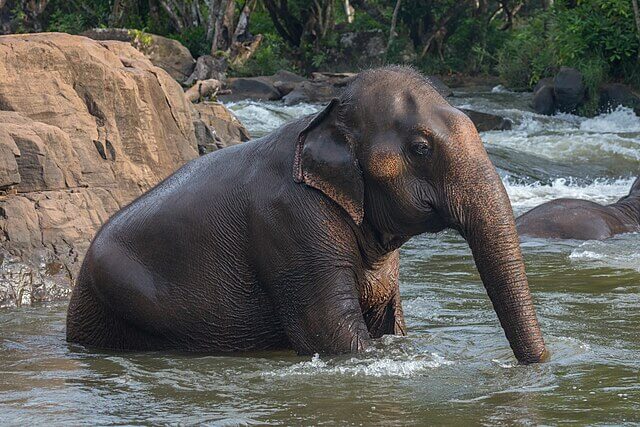
Researchers have achieved a breakthrough in developing a new vaccine to prevent a deadly virus that affects young elephants.
The vaccine, created by an international team of researchers, is designed to protect against the severe disease caused by elephant endotheliotropic herpesvirus (EEHV) — currently one of the leading causes of death among young Asian elephants.
Trials involving adult elephants at Chester Zoo found the vaccine to be safe and, crucially, capable of stimulating the part of the immune system that helps combat viruses.
Professor Falko Steinbach, from the UK Animal and Plant Health Agency (APHA) and the University of Surrey, described the achievement as “a landmark moment in our work to protect Asian elephants.”
It is hoped that the results of this pioneering trial will pave the way for preventing the deaths of young elephants from this dangerous virus.
EEHV has had a particularly devastating impact in zoos. At Chester Zoo alone, seven baby elephants have died from it over the past decade. The virus has also been detected in wild elephant herds, as well as in sanctuaries and orphanages.
The disease causes severe haemorrhaging — uncontrolled internal bleeding that can be fatal within 24 hours — and leads to death in over 80% of juvenile cases.
Why EEHV is so deadly remains unclear. Many adult elephants carry the virus without showing any signs of illness. However, young calves are believed to be especially vulnerable during weaning, when the protective antibodies from their mother’s milk begin to wane.
At this stage, a calf’s immune system is finely balanced and can become overwhelmed.
“It can cause really severe disease,” Dr Katie Edwards, lead conservation scientist at Chester Zoo said.
“It does affect wild elephants, but we don’t have an exact number of how many deaths in total it has caused. For elephants in human care [in zoos and sanctuaries] though, there have been more than 100 deaths.”
The research team, led by veterinary scientists at the University of Surrey and the APHA, developed the new vaccine using a tried-and-tested “scaffold”. Essentially, the basic structure of this vaccine is identical to one routinely used to immunise elephants against cowpox.
The scientists incorporated proteins from EEHV — harmless components of the virus that the elephant’s immune system can recognise and respond to — into this vaccine framework.
In a world-first trial, the new vaccine was tested on three healthy adult elephants at Chester Zoo, and blood samples from the vaccinated animals were subsequently analysed.
Professor Steinbach said the results, published in the journal Nature Communications, were “better than we had hoped for.”
“They showed, unequivocally that the vaccine was able to stimulate the production of [immune cells called] T cells, that are crucial to fighting viral infections.”
The next stage of research will involve testing the vaccine in younger elephants — the group most at risk from the disease.
Currently, four injections are required to administer the vaccine, so the team also hopes to determine whether the same level of protection can be achieved with a simpler regimen — potentially with fewer jabs.
Dr Edwards explained: “Ultimately we want to use this vaccine in the elephants that are at risk, so we want to make sure that we can get it to where it’s needed.”
Prof Steinbach added: “We think this is a significant step forward, and not necessarily only for the elephants, but because it also shows that you can design and apply vaccines to help endangered species.”
——————————————————————————
At Natural World Fund, we are passionate about restoring habitats in the UK to halt the decline in our wildlife.

